Brexit and BSI's standards position: an update
BSI Staff Writer
Published date: |
|
Modified date: |
|
The UK Government released its white paper The future relationship between the United Kingdom and the European Union on July 12. It sets out the Government's vision for the future relationship between the UK and the EU, based on an economic partnership and a set of governance mechanisms to oversee it.
BSI has engaged the UK Government since the referendum, educating, informing and advocating support for our position on Brexit and standards. This position sees BSI continuing to provide, post-Brexit, the standards-developing framework that our stakeholders need to trade nationally, in Europe and internationally.
After many conversations with our members and stakeholders about the implications of Brexit, there was consensus that remaining as a full member of the  ropean standards organizations was the best way forward.
ropean standards organizations was the best way forward.
BSI published Brexit and standards: Position statement in February 2018.
The eight key principles that we rested our position on are as follows.
- Standards provide a passport to trade.
- The European standards system has simplified the market structure in Europe through the use of the single national standard model across 34 countries in the region.
- The European standards system neither is owned by nor is an agency of the EU.
- The UK has significant influence in the development of European standards.
- Maintaining full UK membership of CEN and CENELEC is important to the success of business in Europe post-Brexit.
- Maintaining full CEN and CENELEC membership also brings benefits to consumers and other public interest groups.
- BSI must therefore continue as a full member of CEN and CENELEC post-Brexit.
- Standards will provide a key element underpinning future free trade agreements between the UK and non-EU countries.
The Government's recently released white paper has supported our principles.
There is a specific section on standards, which states: 'the British Standards Institution (BSI) would retain its ability to apply the "single standard model" – so that where a voluntary European standard is used to support EU rules, the BSI could not put forward any competing national standards'.
As with the Government's 2017 paper, BSI is the only private sector organization mentioned. Both this fact and the clear support for BSI's position reflect the success of BSI's engagement effort over the past 2 years.
This clearly endorses the BSI position on standards and Brexit, supporting BSI's continued role in CEN and CENELEC, and follows on from a letter received by BSI last month from Secretary of State for Business, Energy and Industrial Strategy Greg Clark MP, in which he confirmed that the Government would not change its established approach to the use of voluntary standards to support trade. In the letter he also encouraged BSI to fulfil its mandate as the UK's national standards body and to maintain UK influence in the European standards organizations.
This success also comes from the high level of stakeholder commitment to BSI's position through key representative organizations like EEF, the CBI and the British Chambers of Commerce, as well as through professional institutions, consumer organizations and standards users.
BSI maintains the UK's national standards body membership of the three European standardization organizations CEN, CENELEC and ETSI.
Although BSI greatly values the UK Government's position on standards, BSI stresses that continued membership of CEN and CENELEC post-Brexit is not determined by any specific relationship between the UK and the EU post-Brexit. CEN and CENELEC develop European standards, not 'EU standards'. They include national members from countries outside the EU, including Switzerland and Norway, and are not agencies of the EU but private associations owned by their members, including BSI.
BSI is continuing to work with European partners to make whatever changes are required to the statutes of CEN and CENELEC in order to reflect the UK's status outside the EU.
Click here to provide feedback

